Gardener Newbury Park: Nurturing Beauty in Your Local Garden

Introduction to Gardening in Newbury Park
Gardening in Newbury Park offers a unique blend of **natural beauty** and **community spirit**. Whether you're a seasoned gardener or just starting out, the climate and soil conditions here provide an excellent foundation for a thriving garden. The residents of Newbury Park take pride in their green spaces, creating vibrant and lush environments that enhance the neighborhood's charm.
With a variety of plant options available, gardeners can experiment with different species, from colorful annuals to sturdy perennials. The local climate supports a wide range of plants, making it easier to achieve a beautiful and sustainable garden. Moreover, the community offers ample resources and support for those looking to cultivate their green thumb.
Engaging in gardening not only beautifies your surroundings but also contributes to your well-being. Spending time in the garden can reduce stress, promote physical activity, and provide a sense of accomplishment. In Newbury Park, gardening is more than just a hobby—it's a way of life that fosters connections and strengthens the community.

Understanding the Climate and Soil of Newbury Park
Newbury Park enjoys a Mediterranean climate, characterized by **mild, wet winters** and **warm, dry summers**. This climate is ideal for a variety of plants, allowing gardeners to grow everything from drought-resistant succulents to lush flowering shrubs. Understanding the local weather patterns is crucial for selecting the right plants and planning your gardening schedule effectively.
The soil in Newbury Park is primarily sandy loam, which provides good drainage and aeration for plant roots. However, it can be low in organic matter, so amending the soil with compost or other organic materials is beneficial. Regular soil testing can help you determine the nutrient levels and pH balance, ensuring that your plants receive the optimal conditions for growth.
Additionally, gardeners should be mindful of water conservation practices, especially during the dry summer months. Implementing drip irrigation systems and using mulch can help retain moisture in the soil, reducing the need for frequent watering and promoting sustainable gardening practices.
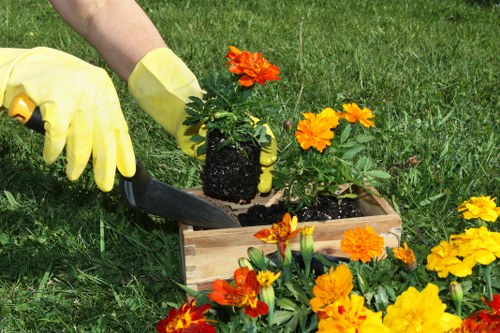
Best Plants for Newbury Park Gardens
Choosing the right plants is essential for creating a beautiful and resilient garden in Newbury Park. Here are some top selections that thrive in the local climate and soil conditions:
- Lavender: Known for its fragrant flowers and drought resistance, lavender is perfect for adding color and scent to your garden.
- California Poppy: The state flower, with its vibrant orange blooms, adds a splash of color and attracts pollinators.
- Succulents: These hardy plants require minimal water and come in a variety of shapes and sizes, making them versatile for different garden styles.
- Japanese Maple: Offering stunning foliage and a unique structure, Japanese maples are excellent for adding visual interest.
- Rosemary: A versatile herb that not only serves culinary purposes but also adds greenery and a pleasant aroma to your garden.
Selecting native plants can also enhance the sustainability of your garden, as they are well-adapted to the local environment and require less maintenance. Incorporating a mix of perennials and annuals ensures continuous blooming and variety throughout the year.
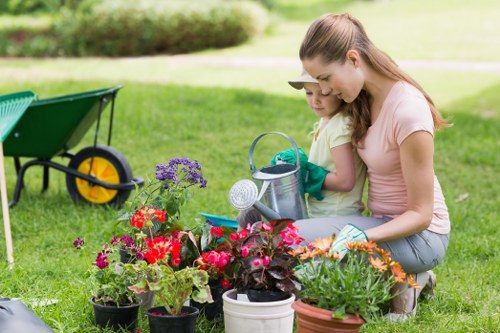
Seasonal Gardening Tips for Newbury Park Residents
Gardening in Newbury Park requires attention to seasonal changes to maintain a healthy and vibrant garden. Here are some tips to help you navigate each season:
Spring
- Start preparing your soil by adding compost and other organic matter.
- Plant early spring flowers like tulips and daffodils.
- Prune shrubs and trees to encourage new growth.
Summer
- Implement efficient watering systems to combat the dry heat.
- Plant heat-tolerant vegetables and flowers.
- Apply mulch to retain soil moisture and reduce weeds.
Fall
- Plant bulbs for spring blooms.
- Rake fallen leaves to prevent mold and enrich the soil.
- Protect sensitive plants from the cooler temperatures.
Winter
- Plan and design your garden layout for the upcoming year.
- Prune dormant trees and shrubs.
- Use covers to protect plants from frost.
By following these seasonal tips, you can ensure that your garden remains healthy and beautiful all year round.
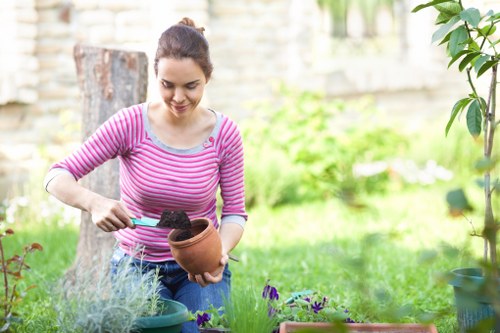
Sustainable Gardening Practices in Newbury Park
Sustainability is a key aspect of gardening in Newbury Park. Implementing eco-friendly practices not only benefits the environment but also creates a more resilient garden. Here are some sustainable gardening methods to consider:
- Composting: Recycle kitchen scraps and garden waste to create nutrient-rich compost for your soil.
- Rainwater Harvesting: Collect rainwater to use for irrigation, reducing reliance on municipal water systems.
- Native Plant Selection: Choose native species that require less water and are more resistant to local pests.
- Integrated Pest Management: Use natural predators and organic treatments to manage pests without harmful chemicals.
- Mulching: Apply organic mulch to retain soil moisture, suppress weeds, and improve soil health.
Adopting these practices can lead to a more sustainable and low-maintenance garden, contributing to the overall health of the ecosystem in Newbury Park.

Maintenance and Care: Keeping Your Garden Thriving
Regular maintenance is essential for a thriving garden. Here are some key tasks to keep your garden in top condition:
- Watering: Ensure your plants receive adequate water, especially during dry periods. Early morning watering reduces evaporation.
- Pruning: Remove dead or diseased branches to promote healthy growth and prevent the spread of pests.
- Weeding: Regularly remove weeds to prevent competition for nutrients and water.
- Fertilizing: Apply appropriate fertilizers to supply essential nutrients for plant growth.
- Pest Control: Monitor your garden for signs of pests and take action promptly to manage infestations.
Consistent care and attention will ensure that your garden remains vibrant and resilient, providing beauty and enjoyment for years to come.
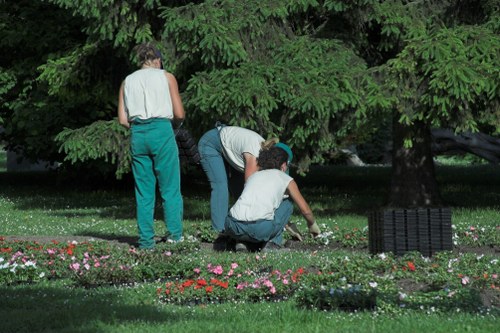
Local Gardening Services and Resources in Newbury Park
Newbury Park offers a variety of local gardening services and resources to support both novice and experienced gardeners. These include:
- Nurseries and Garden Centers: Access a wide range of plants, tools, and supplies tailored to the local climate.
- Community Gardens: Join shared gardening spaces to collaborate with fellow enthusiasts and cultivate communal green spaces.
- Workshops and Classes: Participate in educational sessions on topics like composting, plant care, and sustainable practices.
- Garden Clubs: Connect with local garden clubs to exchange tips, share experiences, and explore gardening opportunities.
- Online Forums and Groups: Engage with online communities focused on gardening in Newbury Park for advice and support.
Utilizing these resources can enhance your gardening experience, providing you with the knowledge and tools needed to create and maintain a beautiful garden.
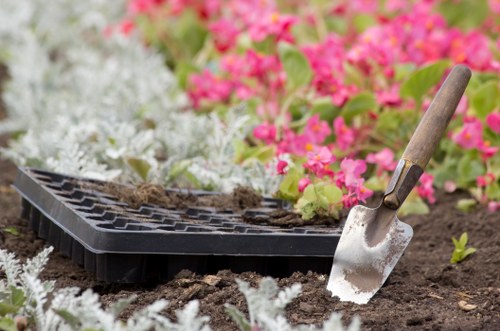
Community and Gardening Events in Newbury Park
The sense of community in Newbury Park extends to its gardening events and activities. Participating in these events can foster connections and inspire new ideas for your garden. Some notable events include:
- Spring Flower Festivals: Celebrate the blooming season with vibrant displays and workshops.
- Neighborhood Plant Swaps: Exchange plants and seeds with fellow gardeners to diversify your garden.
- Garden Tours: Explore beautifully maintained gardens in the area for inspiration and ideas.
- Workshops on Sustainable Practices: Learn about eco-friendly gardening techniques and sustainability.
- Holiday Decorating Contests: Showcase your creativity with festive garden decorations.
Engaging in these community events not only enriches your gardening journey but also strengthens the bonds within the Newbury Park community.

Exploring Nearby Areas for Gardening Inspiration
Newbury Park is surrounded by several nearby areas, each offering unique features and inspirations for gardeners. Exploring these neighborhoods can provide new ideas and opportunities to enhance your garden:
- Thousand Oaks: Known for its expansive parks and botanical gardens, offering a variety of plant species and gardening techniques.
- Agoura Hills: Features a blend of residential and natural landscapes, perfect for observing diverse plant arrangements.
- Westlake Village: Offers beautifully landscaped estates and gardens that can inspire your own garden design.
- Newport Beach: With its coastal influences, you can find plants suited for seaside gardening and enjoy marine-inspired gardening palettes.
- Simi Valley: Home to several community gardens and agricultural centers, providing resources and inspiration for local gardeners.
- Agua Dulce: Offers a more rural setting, ideal for those interested in larger garden spaces and agricultural gardening.
- Somis: Known for its agricultural heritage, Somis provides opportunities to learn about traditional gardening and farming practices.
- Chatsworth: Features diverse plant life and gardening communities, perfect for exchanging ideas and techniques.
- Ventura: A nearby city with extensive gardening resources, including nurseries, workshops, and community gardens.
- Calabasas: Offers modern garden designs and sustainability-focused gardening practices.
By exploring these areas, you can gather inspiration, discover new plant varieties, and connect with other gardening enthusiasts, enriching your gardening experience in Newbury Park.
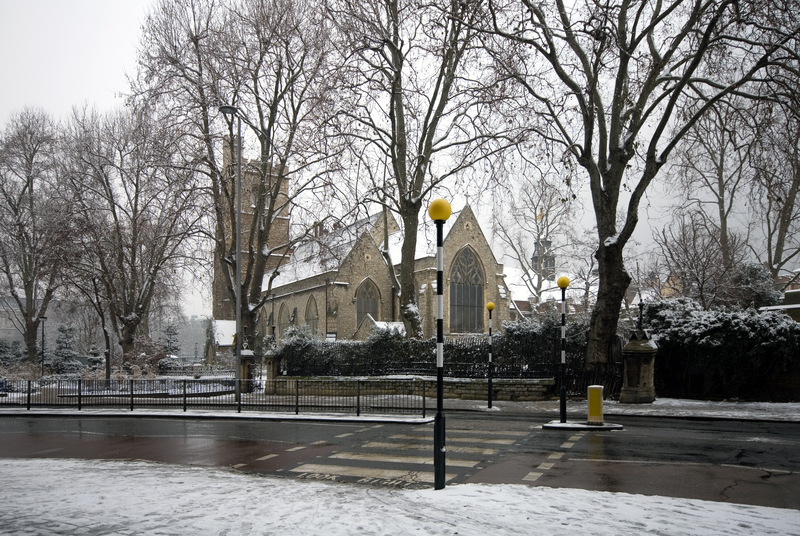
Conclusion
Gardening in Newbury Park is a rewarding endeavor that combines **natural beauty**, **community engagement**, and **sustainable practices**. By understanding the local climate and soil, selecting the right plants, and maintaining your garden with care, you can create a thriving green space that enhances your home and the surrounding community. Embrace the resources and events available, and connect with fellow gardeners to share experiences and grow together. Whether you're cultivating a small balcony garden or a sprawling backyard oasis, the spirit of gardening in Newbury Park will nurture both your plants and your well-being.
Frequently Asked Questions
1. What are the best plants for drought-resistant gardens in Newbury Park?
Answer: Some of the best drought-resistant plants for Newbury Park include lavender, succulents, California poppy, rosemary, and agave. These plants thrive in the warm, dry summers and require minimal watering once established.
2. How can I improve the soil quality in my Newbury Park garden?
Answer: Improving soil quality can be achieved by adding organic matter such as compost, mulch, or well-rotted manure. Conducting a soil test will help you understand the nutrient levels and pH balance, allowing you to make necessary amendments.
3. Are there any community gardening programs in Newbury Park?
Answer: Yes, Newbury Park has several community gardening programs and shared garden spaces where residents can collaborate, share resources, and enjoy gardening together. Check with local community centers or municipal offices for more information.
4. What sustainable gardening practices are recommended for Newbury Park?
Answer: Sustainable practices include composting, rainwater harvesting, using native plants, implementing drip irrigation, and practicing integrated pest management. These methods help conserve resources and create a healthier garden ecosystem.
5. When is the best time to plant perennials in Newbury Park?
Answer: The best time to plant perennials in Newbury Park is in the fall or early spring. Planting in these seasons allows perennials to establish their root systems before the extreme temperatures of summer or winter.











